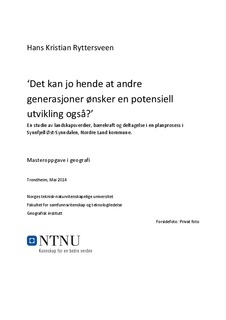‘Det kan jo hende at andre generasjoner ønsker en potensiell utvikling også?' : en studie av landskapsverdier, bærekraft og deltagelse i en planprosess i Synnfjell Øst-‐Synndalen, Nordre Land kommune
Master thesis
Permanent lenke
http://hdl.handle.net/11250/2448471Utgivelsesdato
2014Metadata
Vis full innførselSamlinger
- Institutt for geografi [1097]
Sammendrag
This thesis addresses questions and links between landscape values and implementation of three different dimensions of sustainable development in a local planning process of a mountain area in South Eastern Norway. This is a qualitative study based on semi-structured interviews, analysis of public documents and consultative statements, and participatory observation. The theoretical foundation of the project has its point of departure in the concept of landscape, and how people understand landscape differently. Landscape, planning and sustainability are therefore both the theoretical and thematic pillars of the project. I found that there are ranges of different value assessments linked to the area of study, whereas economic and non-economic value assessments are especially emphasized in the data material. The link between the social, economic and environmental dimension of sustainable development and value assessments is illustrated in the analysis. I found that economic value assessments could be linked to the concept of economic sustainability whereas non-economic value assessments can be linked to the concept of environmental sustainability. Social sustainability is mainly linked to the participants’ views on participation and involvement in the local planning process. The study shows that public involvement, to a certain degree is taken care of in the process. Nevertheless, tendencies towards an asymmetrical degree of influence on the process between economic and non-economic value assessments seem to be present. According to a selection of critical objectives of sustainable development within the three dimensions of sustainability, it appears that the concept of sustainability, to a certain degree, is implemented in the planning process through public participation and involvement. Value assessments therefore seem to be a limited, but nonetheless, capable and useful tool of identifying sustainable development within the environmental and economic dimension of sustainable development.
